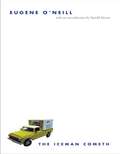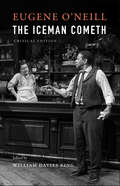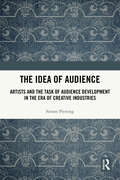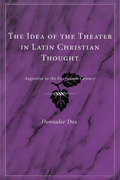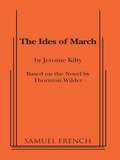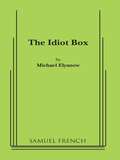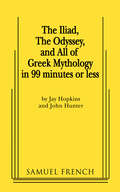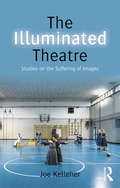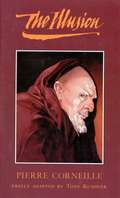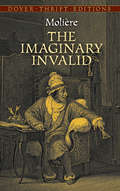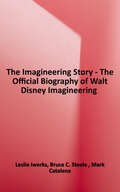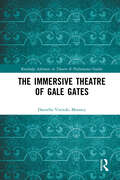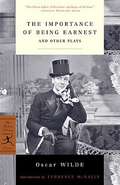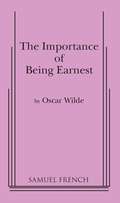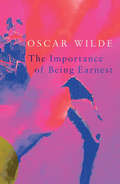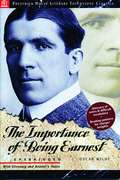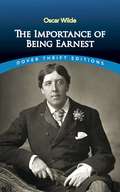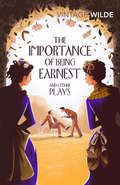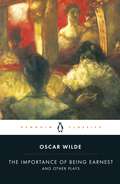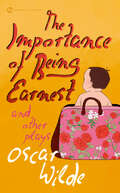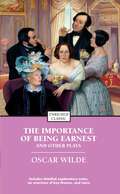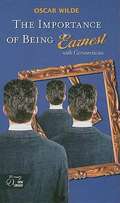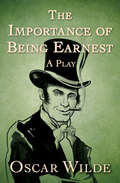- Table View
- List View
The Iceman Cometh
by Eugene O'NeillEugene O’Neill was the first American playwright to win the Nobel Prize in Literature. He completed The Iceman Cometh in 1939, but he delayed production until after the war, when it enjoyed a long run of performances in 1946 after receiving mixed reviews. Three years after O'Neill's death, Jason Robards starred in a Broadway revival that brought new critical attention to O’Neill’s darkest and most nihilistic play. In the half century since, The Iceman Cometh has gained enormously in stature, and many critics now recognize it as one of the greatest plays in American drama. The Iceman Cometh focuses on a group of alcoholics and misfits who endlessly discuss but never act on their dreams, and Hickey, the traveling salesman determined to strip them of their pipe dreams.
The Iceman Cometh
by Eugene O'NeillA critical edition of O&’Neill&’s most complex and difficult play, designed for student readers and performers This critical edition of Eugene O&’Neill&’s most complex and difficult play helps students and performers meet the work&’s demanding cultural literacy. William Davies King provides an invaluable guide to the text, including an essay on historical and critical perspectives; extensive notes on the language used in the play, and its many musical and literary allusions; as well as numerous insightful illustrations. He also gives biographical details about the actual people the characters are based on, along with the performance history of the play, to help students and theatrical artists engage with this labyrinthine work.
The Idea of Audience: Artists and the Task of Audience Development in the Era of Creative Industries
by Simon PieningWhat sort of relationship do artists want with their audience? What kind of role do they imagine for the performing arts in their community?Under the “creative industries”, the audience relationship has been increasingly defined and shaped by marketing and/or institutional interests. Wedged between the competing needs of the market, and their belief in the power of art to positively impact their communities, many artists and arts workers are caught in what Julian Meyrick describes as a “confused intellectual terrain”. While much audience scholarship has focused on understanding the motivations of audience members engaging with the arts, there has been considerably less research into the motivations of arts professionals with respect to their relationship with the audience. The Idea of Audience is a critical examination of the current fields of audience development and arts marketing, and explores the relationship between artists and audiences from the perspective of the artists themselves.The book will be of most interest to students and academics of audience development/arts marketing, theatre/performance, and audience studies. It is hoped that the reader will gain greater insight into what artists actually mean when they talk about their audience.
The Idea of the Theater in Latin Christian Thought: Augustine to the Fourteenth Century
by Donnalee DoxMedieval thinkers did not construe drama as theatrical performances, Dox (performance studies, Texas A&M U. ) argues, because of how thought was organized beginning with the late classical transmitters and through the Scholastics. Theater as a performance practice and institutional institution was distinguished from poetry, rhetoric, reading, and writing until the height of the Scholastic period, early in the 14th century, when this categorical distinction began to break down. She says her conclusions complement rather than challenge others derived from the same material. Annotation ©2004 Book News, Inc. , Portland, OR (booknews. com)
The Ides of March: A Novel (Modern Classics Ser.)
by Jerome KiltyHistory / 9m, 6f, extras / Platform stage / The action spans the year before and up to Caesar's assassination, introducing us to Cleopatra on her visit to Rome. Caesar has given some strict proscriptions; but all the same he falls in love with her again. This infuriates a patrician woman of Rome. Her attempts to have Antony seduce Cleopatra pay off when Caesar discovers them together. He is preparing to leave on a tour the Ides of March, but that morning he receives twenty-three stab wounds, and dies untended on the street.
The Idiot Box
by Michael Elyanow6m, 4f / Comedy / Interior / THE IDIOT BOX tells the story of six sitcom characters whose lives are shaken when reality crashes into their perfect world. As the artifice of their lives unravels, each character discovers powerful truths about race, love, sexuality and the America outside they never knew existed - resulting in a theatrical experience that, according to The Hollywood Reporter, "is a glittering absurdist farce...with a sinister undertow that takes hold early and never lets go."
The Iliad, The Odyssey, and All Of Greek Mythology in 99 Minutes or Less
by John Hunter Jay HopkinsComedy / 3m, 2f / On a simple stage, with the clock ticking in front of everyone's eyes, the cast speeds through all of Greek Mythology. Its funny, updated and made easy to understand. The Gods walk the Red Carpet. The Creation of Mankind is a botched subcontractors job. Man and Pandora try settling down despite an ominous wedding gift. Love stories are a dating show and the Greek Tragedies are sports highlights! And don't forget the two greatest stories ever told, The Iliad and The Odyssey. Kidnap Helen of Troy and you've got a 10 year slap-fight of epic proportions with pouty Achilles, war-hungry Agamemnon and clever Odysseus, destined to wander the seas for 10 more years fighting giants, seductresses and the Gods themselves. All the silly decisions, the absurd destinies, and the goofy characters are presented lightning-bolt fast with hysterical results as the clock is stopped with only seconds to spare.
The Illuminated Theatre: Studies on the Suffering of Images
by Joe KelleherWhat sort of thing is a theatre image? How is it produced and consumed? Who is responsible for the images? Why do the images stay with us when the performance is over? How do we learn to speak of what we see and imagine? And how do we relate what we experience in the theatre to what we share with each other of the world? The Illuminated Theatre is a book about theatricality and spectatorship in the early twenty-first century. In a wide-ranging analysis that draws upon theatrical, visual and philosophical approaches, it asks how spectators and audiences negotiate the complexities and challenges of contemporary experimental performance arts. It is also a book about how European practitioners working across a range of forms, from theatre and performance to dance, opera, film and visual arts, use images to address the complexities of the times in which their work takes place. Through detailed and impassioned accounts of works by artists such as Dickie Beau, Wendy Houstoun, Alvis Hermanis and Romeo Castellucci, along with close readings of experimental theoretical and art writing from Gillian Rose to T.J. Clark and Marie-José Mondzain, the book outlines the historical, aesthetic and political dimensions of a contemporary ‘suffering of images.’
The Illusion
by Pierre Corneille Tony KushnerAlready a favorite of theatres throughout the country, Tony Kushner's free adaptation of Pierre Corneille's most original, theatrical comedy, L'Illusion Comique, blends magic and truth, obsession and caprice, romance and murder, into an enticing exploration of the greatest illusion--love.
The Illustrated Shakespeare, 1709-1875
by Stuart SillarsIllustrations have been an important element of many of the most extensively read editions of Shakespeare's plays, from the frontispieces to Nicholas Rowe's 1709 edition to the multiple images placed within the text of Victorian editions. Through symbols the illustrations have explored language and character; by allusion to earlier paintings they have offered critical readings; and by gesture, setting and costume they have redesigned the plays within the visual vocabulary of their own times. In all these ways they offer important exchanges with contemporary social, aesthetic and critical concerns, and, despite being largely ignored by scholars, are central to the plays' reception. Highly illustrated, including many images not previously reproduced, the book allows the reader to share the experience of early readers of the plays. Building on the author's earlier work in Painting Shakespeare it offers a fresh address to the tradition of visual criticism and assimilation of Shakespeare's plays.
The Imaginary Invalid
by Molière Henri Van LaunThe greatest writer of French classic comedy, the 17th-century playwright Molière was one of the most brilliant satirists in the history of literature. His keen observations and barbed wit deflated the pretensions of society in his day and focused a brilliant light on the universal frailties of humanity.The Imaginary Invalid, one of Molière's funniest and most incisive satires, is also among the most performed worldwide and perennially studied in world literature courses. In this entertaining gem, a hypochondriac, victimized by two pompous doctors, tests his daughter's loyalty and discovers the greed and contempt of his scheming wife.
The Imagineering Story: The Official Biography of Walt Disney Imagineering
by Leslie Iwerks Bruce C. Steele Mark CatalenaThe highly acclaimed and rated Disney+ documentary series, The Imagineering Story, becomes a book that greatly expands the award-winning filmmaker Leslie Iwerks' narrative of the fascinating history of Walt Disney Imagineering. The entire legacy of WDI is covered from day one through future projects with never-before-seen access and insights from people both on the inside and on the outside. So many stories and details were left on the cutting room floor--this book allows an expanded exploration of the magic of Imagineering. So many insider stories are featured. - Sculptor Blaine Gibson's wife used to kick him under the table at restaurants for staring at interesting-looking people seated nearby, and he'd even find himself studying faces during Sunday morning worship. "You mean some of these characters might have features that are based on people you went to church with?" Marty Sklar once asked Gibson of the Imagineer's sculpts for Pirates of the Caribbean. "He finally admitted to me that that was true." - In the early days, Walt Disney Imagineering was in one little building and everybody parked in the back and you came in through the model shop, and you could see everything that was going on,"" recalled Marty Sklar. "When we started on the World's Fair in 1960 and 1961, we had 100 people here. And so everybody knew everything about what was happening and the status of each project, so you really felt like you were part of the whole team, whether you were working on that project or not. And, you know, there was so much talent here.
The Immersive Theatre of GAle GAtes (Routledge Advances in Theatre & Performance Studies)
by Daniella Vinitski MooneyThis book focuses on experimental theatre company, GAle GAtes, credited as "the true innovator" of the contemporary immersive movement. The Immersive Theatre of GAle GAtes is a case-study of this little-known but visionary company, with a focus on its development and dramaturgy. Through rare archival and primary research, as well as historical context, the text chronicles company narrative and celebrates the artistic impulse. The book employs descriptive-narrative and dramaturgical analysis and is composed of historical research, rare archives, and primary source interviews. Chapters focus on the trajectory of the avant-garde leading up to the climate in which the company formed, company formative years, and major works and a discussion on the interdisciplinary and theoretical frameworks critical to its understanding. This study will be of great interest to students and scholars in theatre and performance studies and essential reading for theatre artist and historian alike, with a focus on the experimental theatre landscape.
The Importance of Being Earnest
by Oscar Wilde Terrence McnallyOscar Wilde created his final and most lasting play, comic masterpieces of all time, THE IMPORTANCE OF BEING EARNEST, in 1895. Considered one of the greatest THE IMPORTANCE OF BEING EARNEST is a farce, playing with love, religion, and truth as it tells the tale of two men. Jack Worthing and Algernon Moncrieff, who bend the truth in order to add excitement to their lives. Jack invents an imaginary brother, Ernest, whom he uses as an excuse to escape from his dull country home and gallavant in town. Meanwhile, Algernon follows Jack's scam, but his imaginary friend, Bumbury, provides a convenient method of adventuring in the country. However, their deceptions eventually cross paths, resulting in a series of crises that threaten to spoil their romantic pursuits. Hailed as the first modern comedy in England, THE IMPORTANCE OF BEING EARNEST is Wilde's most famous work. This collection also features two other plays that Wilde penned earlier in his career, LADY WINDERMERE'S FAN and AN IDEAL HUSBAND, that also display his ability to convey warmth and wit through his hilarious characters and their outlandish situations.
The Importance of Being Earnest
by Oscar WildeOscar WildeFull Length, Farce comedy . Charcters: 5 male, 4 female . Exterior Set and 2 Interior Sets . This masterpiece is probably the most famous of all comedies. It revolves wittily around the most ingenious case of "manufactured" mistaken identity ever put into a play.
The Importance of Being Earnest
by Oscar WildeA farcical comedy in which the protagonists maintain fictitious personæ to escape burdensome social obligations, this play is an unforgettable satire of Victorian ways. Wilde's notoriety caused the play, despite its early success, to be closed after 86 performances. This latest edition allows you to discover or enjoy once again the writing of one of history's great comedy and drama writers.
The Importance of Being Earnest
by Oscar WildeThe Importance of Being Earnest have made it for the high school curriculum for decades. Cecily Cardew and Gwendolen Fairfax are both in love with the same mythical suitor. Jack Worthing has wooed Gwendolen as Ernest, while Algernon has also posed as Ernest to win the heart of Jack's ward, Cecily. When all four arrive at Jack's country home on the same weekend, pandemonium breaks loose. Only a senile nursemaid and an old, discarded hand-bag can save the day.
The Importance of Being Earnest (Dover Thrift Edition)
by Oscar WildeHere is Oscar Wilde's most brilliant tour de force, a witty and buoyant comedy of manners that has delighted millions in countless productions since its first performance in London's St. James' Theatre on February 14, 1895. The Importance of Being Earnest is celebrated not only for the lighthearted ingenuity of its plot, but for its inspired dialogue, rich with scintillating epigrams still savored by all who enjoy artful conversation.From the play's effervescent beginnings in Algernon Moncrieff's London flat to its hilarious denouement in the drawing room of Jack Worthing's country manor in Hertfordshire, this comic masterpiece keeps audiences breathlessly anticipating a new bon mot or a fresh twist of plot moment to moment.
The Importance of Being Earnest and Other Plays
by Oscar WildeOscar Wilde was already one of the best-known literary figures in Britain when he was persuaded to turn his extraordinary talents to the theatre. Between 1891 and 1895 he produced a sequence of distinctive plays which spearheaded the dramatic renaissance of the 1890s and retain their powertoday. This collection offers newly edited texts of Lady Windermere's Fan, A Woman of No Importance, Salome, An Ideal Husband, and, arguably the greatest farcical comedy in English, The Importance of Being Earnest. [This text is listed as an example that meets Common Core Standards in English language arts in grades 11-12 at http://www.corestandards.org.]
The Importance of Being Earnest and Other Plays
by Oscar WildeA selection of Oscar Wilde's best and most important plays - sharp, relevant and brilliant to this day. Who would have thought a comedy of manners written more than a hundred years ago would still be so apt and so funny? Oscar Wilde was a genius of play-writing, and his deftness, wit and sharp eye for social satire keep audiences in thrall to this day. Alongside Earnest, discover a biblical tragedy retold, Lady Windemere and her infamous fan and Wilde's take on an ideal husband, in this selection of Wilde's most important plays. ‘[The Importance of Being Earnest] has a strong claim to being the most perfect comedy in the English language’ Daily Telegraph
The Importance of Being Earnest and Other Plays
by Oscar WildeLady Windermere's Fan/Salomé/A Woman of No Importance/An Ideal Husband/A Florentine Tragedy/The Importance of Being Earnest'To lose one parent may be regarded as a misfortune; to lose both looks like carelessness'The Importance of Being Earnest is a glorious comedy of mistaken identity, which ridicules codes of propriety and etiquette. Snobbery and hypocrisy are also laid bare in Lady Windermere's Fan, A Woman of No Importance and An Ideal Husband, while in Salomé and A Florentine Tragedy, Wilde uses historical settings to explore the complex relationship between sex and power. The range of these plays displays Wilde's delight in artifice, masks and disguises, and reveals the pretensions of the social world in which he himself played such a dazzling and precarious part.Edited with Introduction, Commentaries and Notes by Richard Allen Cave
The Importance of Being Earnest and Other Plays
by Oscar WildeA universal favorite, The Importance of Being Earnest displays Oscar Wilde&’s wit and theatrical genius at their brilliant best. Subtitled &“A Trivial Comedy for Serious People,&” this hilarious attack on Victorian manners and morals turns a pompous world on its head, lets duplicity lead to happiness, and makes riposte the highest form of art. Written, according to Wilde, &“by a butterfly for butterflies,&” it is a dazzling masterpiece of comic entertainment.Although it was originally written in four acts, The Importance of Being Earnest is usually performed in a three-act version. This authoritative edition features an appendix that restores valuable lines that appeared in the original.Also included in this special collection are Wilde&’s first comedy success, Lady Windermere&’s Fan, and his richly sensual melodrama, Salomé, which he called &“that terrible coloured little tragedy I once in some strange mood wrote&”—and which shocked and enraged the censors of his time.Includes an Introduction by Sylvan Barnetand an Afterword by Elise Bruhl and Michael Gamer
The Importance of Being Earnest and Other Plays: Salome; Lady Windermere's Fan (Enriched Classics)
by Oscar WildeEnriched Classics offer readers accessible editions of great works of literature enhanced by helpful notes and commentary. Each book includes educational tools alongside the text, enabling students and readers alike to gain a deeper and more developed understanding of the writer and their work. Wilde's classic comedy of manners, The Importance of Being Earnest, a satire of Victorian social hypocrisy and considered Wilde's greatest dramatic achievement, and his other popular plays-Lady Windermere's Fan, An Ideal Husband, and Salome-challenged contemporary notions of sex and sensibility, class and cultural identity. Enriched Classics enhance your engagement by introducing and explaining the historical and cultural significance of the work, the author's personal history, and what impact this book had on subsequent scholarship. Each book includes discussion questions that help clarify and reinforce major themes and reading recommendations for further research. Read with confidence.
The Importance of Being Earnest with Connections
by Oscar WildeHolt McDougal Library, High School with Connections
The Importance of Being Earnest: A Play
by Oscar WildeThe controversial comedic play from a master dramatist that shattered social conventions in England. Oscar Wilde&’s most brilliant tour de force, a witty and buoyant comedy of manners, has delighted millions with countless productions since its first performance at London&’s St. James&’ Theatre in 1895. The Importance of Being Earnest is celebrated not only for the lighthearted ingenuity of its plot, but also for its inspired dialogue, rich with scintillating epigrams still savored by all who enjoy artful conversation. From the play&’s effervescent beginnings in Algernon Moncrieff&’s London flat to its hilarious denouement in the drawing room of Jack Worthing&’s country manor in Hertfordshire, this comic masterpiece keeps audiences breathlessly anticipating new bons mots and fresh plot twists from moment to moment. This ebook has been professionally proofread to ensure accuracy and readability on all devices.
